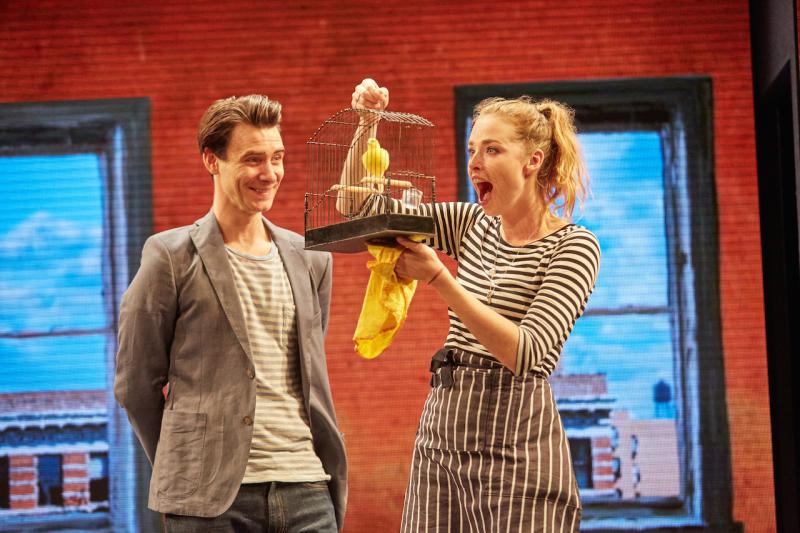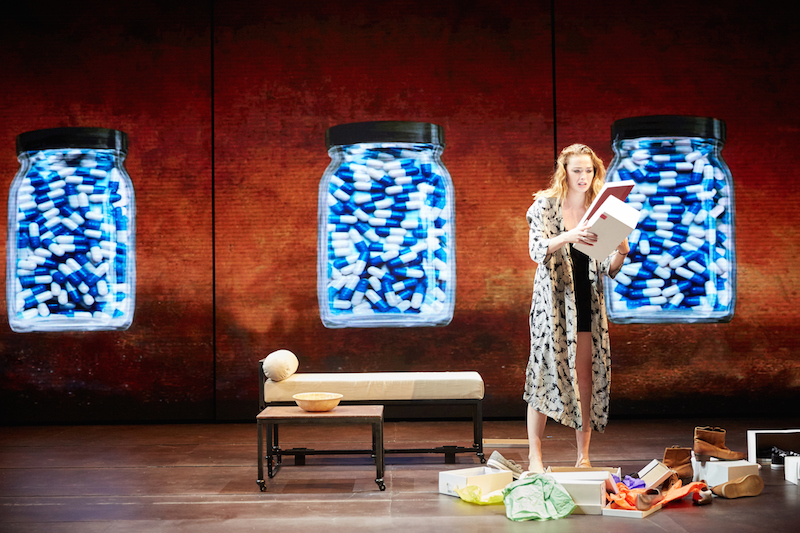Good Canary, Rose Theatre, Kingston | reviews, news & interviews
Good Canary, Rose Theatre, Kingston
Good Canary, Rose Theatre, Kingston
John Malkovich proves himself an ace director in addiction drama

Very occasionally the playing of a play leaves a deeper impression than does the play itself. This is the case with Good Canary, a lippy, sweary tragicomedy by Zach Helm about secrets and addiction on the New York publishing scene. It has already played in translation in Mexico and in France, where it won Molière awards for direction and design.
This is also one of those plays with a plot twist – at precisely its mid-point – so devastating that you find yourself replaying all the earlier scenes in your head for clues. For the first half, though, you do not doubt what you see. Jack (Harry Lloyd), a gentle soul, has just put out his debut novel and is lapping up the critical praise and overnight celebrity while Annie (Freya Mavor, pictured below) is his stay-at-home guard dog, attacking the solecisms of sloppy reviewers and keeping his bed warm. She is bulimic and hooked on amphetamines but hey, that’s only because she wants to remain slim and sexy for her loving husband.
 The production’s strongest selling point is the way it turns an essentially very talky script into a dynamic stage experience, even hyperactive at times, the audience living Annie’s world at her chemically-fuelled tempo. When Annie manically cleans the apartment windows, they shrink and expand with Alice in Wonderland perversity. Elsewhere, Pierre-François Limbosch’s hugely colourful design gives us a dazzling 3D sense of being on New York’s streets – even the brown of the brownstones is intense.
The production’s strongest selling point is the way it turns an essentially very talky script into a dynamic stage experience, even hyperactive at times, the audience living Annie’s world at her chemically-fuelled tempo. When Annie manically cleans the apartment windows, they shrink and expand with Alice in Wonderland perversity. Elsewhere, Pierre-François Limbosch’s hugely colourful design gives us a dazzling 3D sense of being on New York’s streets – even the brown of the brownstones is intense.
Another joy is the superb level of acting from every member of the cast. Ilan Goodman’s fuzzily affable drug dealer delivers some of the play’s best lines. He “cannot determine the price of not selling someone drugs. It requires a level of math [he] never acquired”. Michael Simkins is marvellous as the Trump-like über-publisher, caught out at his own party for not having read the book he is about to invest millions in. And Sally Rogers (so memorable as the hardnosed Northern pub landlady in last year’s hit play Hangmen) is a scream as the tycoon’s nipped and tucked wife.
The playwright’s conflation of addiction and creative genius is ultimately far too easy
It’s impossible to discuss the plot for fear of introducing spoilers. Suffice to say that many scenes have the ring of personal experience: the playwright clearly enjoys his skewering of the self-regarding literary critic from the New York Times (played by Simon Wilson) in an excruciating scene at the publisher’s party. More subtly, he also observes the excluding mateyness of men’s behaviour at such events: how they laugh like drains at each other’s anecdotes, sidelining womenfolk who might have serious things to say. Zach Helm clearly also has had friends whose drug dependency and personality disorder stemmed from negative childhood experiences like Annie’s. Yet not all of these points are fully integrated into the text of the play.
When Annie blurts out that she was raped at nine years old, it’s as if no one heard her, and it’s not referred to again. Similarly, when Jack buys Annie a caged canary (to give her something to tend and care for – pets are often used in the treatment of anorexia – Helm has done his research), the thing barely gets another mention, even though it features in the title of the play. It is also meant to remind us of the use of canaries as early-warning systems in the First World War. But the bird’s relevance to Jack and Annie’s story is far from clear, and the playwright’s conflation of addiction and creative genius is ultimately far too easy.
As with all imperfect plays that are delivered with consummate flair and skill, this one lives vibrantly in the playhouse but stands up less well when you think about it later. See it for the performances – Freya Mavor is a standout – and the immaculate detail of Malkovich’s direction.
The future of Arts Journalism
You can stop theartsdesk.com closing!
We urgently need financing to survive. Our fundraising drive has thus far raised £49,000 but we need to reach £100,000 or we will be forced to close. Please contribute here: https://gofund.me/c3f6033d
And if you can forward this information to anyone who might assist, we’d be grateful.

Subscribe to theartsdesk.com
Thank you for continuing to read our work on theartsdesk.com. For unlimited access to every article in its entirety, including our archive of more than 15,000 pieces, we're asking for £5 per month or £40 per year. We feel it's a very good deal, and hope you do too.
To take a subscription now simply click here.
And if you're looking for that extra gift for a friend or family member, why not treat them to a theartsdesk.com gift subscription?
more Theatre
 The Line of Beauty, Almeida Theatre review - the 80s revisited in theatrically ravishing form
Alan Hollinghurst novel is cunningly filleted, very finely acted
The Line of Beauty, Almeida Theatre review - the 80s revisited in theatrically ravishing form
Alan Hollinghurst novel is cunningly filleted, very finely acted
 Wendy & Peter Pan, Barbican Theatre review - mixed bag of panto and comic play, turned up to 11
The RSC adaptation is aimed at children, though all will thrill to its spectacle
Wendy & Peter Pan, Barbican Theatre review - mixed bag of panto and comic play, turned up to 11
The RSC adaptation is aimed at children, though all will thrill to its spectacle
 Hedda, Orange Tree Theatre review - a monument reimagined, perhaps even improved
Scandinavian masterpiece transplanted into a London reeling from the ravages of war
Hedda, Orange Tree Theatre review - a monument reimagined, perhaps even improved
Scandinavian masterpiece transplanted into a London reeling from the ravages of war
 The Assembled Parties, Hampstead review - a rarity, a well-made play delivered straight
Witty but poignant tribute to the strength of family ties as all around disintegrates
The Assembled Parties, Hampstead review - a rarity, a well-made play delivered straight
Witty but poignant tribute to the strength of family ties as all around disintegrates
 Mary Page Marlowe, Old Vic review - a starry portrait of a splintered life
Tracy Letts's Off Broadway play makes a shimmeringly powerful London debut
Mary Page Marlowe, Old Vic review - a starry portrait of a splintered life
Tracy Letts's Off Broadway play makes a shimmeringly powerful London debut
 Little Brother, Soho Theatre review - light, bright but emotionally true
This Verity Bargate Award-winning dramedy is entertaining as well as thought provoking
Little Brother, Soho Theatre review - light, bright but emotionally true
This Verity Bargate Award-winning dramedy is entertaining as well as thought provoking
 The Unbelievers, Royal Court Theatre - grimly compelling, powerfully performed
Nick Payne's new play is amongst his best
The Unbelievers, Royal Court Theatre - grimly compelling, powerfully performed
Nick Payne's new play is amongst his best
 The Maids, Donmar Warehouse review - vibrant cast lost in a spectacular-looking fever dream
Kip Williams revises Genet, with little gained in the update except eye-popping visuals
The Maids, Donmar Warehouse review - vibrant cast lost in a spectacular-looking fever dream
Kip Williams revises Genet, with little gained in the update except eye-popping visuals
 Ragdoll, Jermyn Street Theatre review - compelling and emotionally truthful
Katherine Moar returns with a Patty Hearst-inspired follow up to her debut hit 'Farm Hall'
Ragdoll, Jermyn Street Theatre review - compelling and emotionally truthful
Katherine Moar returns with a Patty Hearst-inspired follow up to her debut hit 'Farm Hall'
 Troilus and Cressida, Globe Theatre review - a 'problem play' with added problems
Raucous and carnivalesque, but also ugly and incomprehensible
Troilus and Cressida, Globe Theatre review - a 'problem play' with added problems
Raucous and carnivalesque, but also ugly and incomprehensible
 Clarkston, Trafalgar Theatre review - two lads on a road to nowhere
Netflix star, Joe Locke, is the selling point of a production that needs one
Clarkston, Trafalgar Theatre review - two lads on a road to nowhere
Netflix star, Joe Locke, is the selling point of a production that needs one
 Ghost Stories, Peacock Theatre review - spirited staging but short on scares
Impressive spectacle saves an ageing show in an unsuitable venue
Ghost Stories, Peacock Theatre review - spirited staging but short on scares
Impressive spectacle saves an ageing show in an unsuitable venue

Add comment